Abstract
1 Oxotremorine, methyloxotremorine, pilocarpine or arecoline were given intravenously to anaesthetized cats, dogs or rats, and intraperitoneally to conscious normotensive and spontaneously hypertensive rats, pretreated with doses of methylatropine that completely blocked peripheral muscarinic receptors, to ascertain their effects on blood pressure and heart rate.
2 Oxotremorine but not methyloxotremorine produced a prolonged hypotension in cats and dogs but not in rats. Heart rate was not changed. Pilocarpine, although less potent, produced an identical effect, whereas the effect of arecoline was short by comparison. The hypotensive effect of these drugs was reversed by atropine.
3 In dogs, oxotremorine produced a prolonged hypotension with no change in heart rate or cardiac output.
4 A decrease in spontaneous sympathetic nerve activity accompanied the hypotension in cats. Both effects were reversed by atropine but could be reinvoked by large doses of oxotremorine.
5 The oxotremorine-induced hypotension in cats was not altered by decerebration but was abolished by high cervical spinal section.
6 The results indicate that the prolonged hypotension elicited by oxotremorine is mediated by an action at muscarinic receptors in the brain stem resulting in a decrease in sympathetic nerve activity and peripheral resistance but not heart rate or cardiac output.
Full text
PDF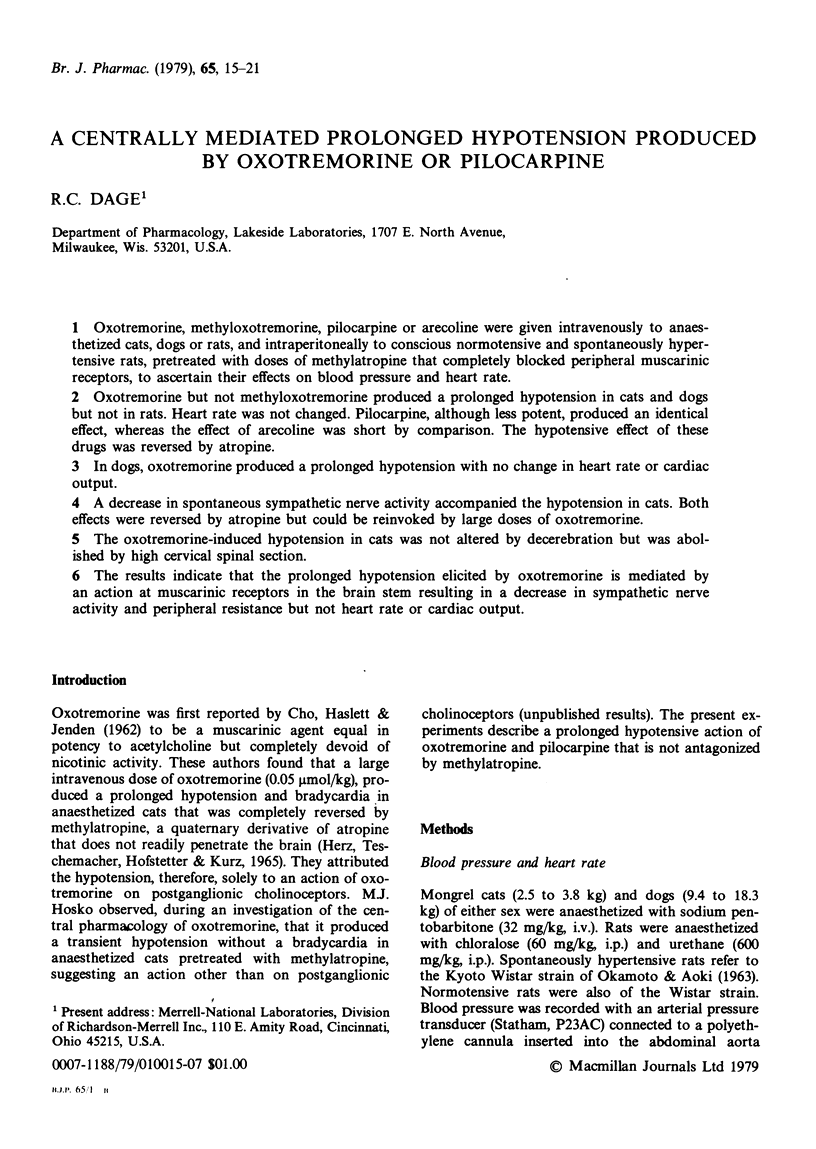
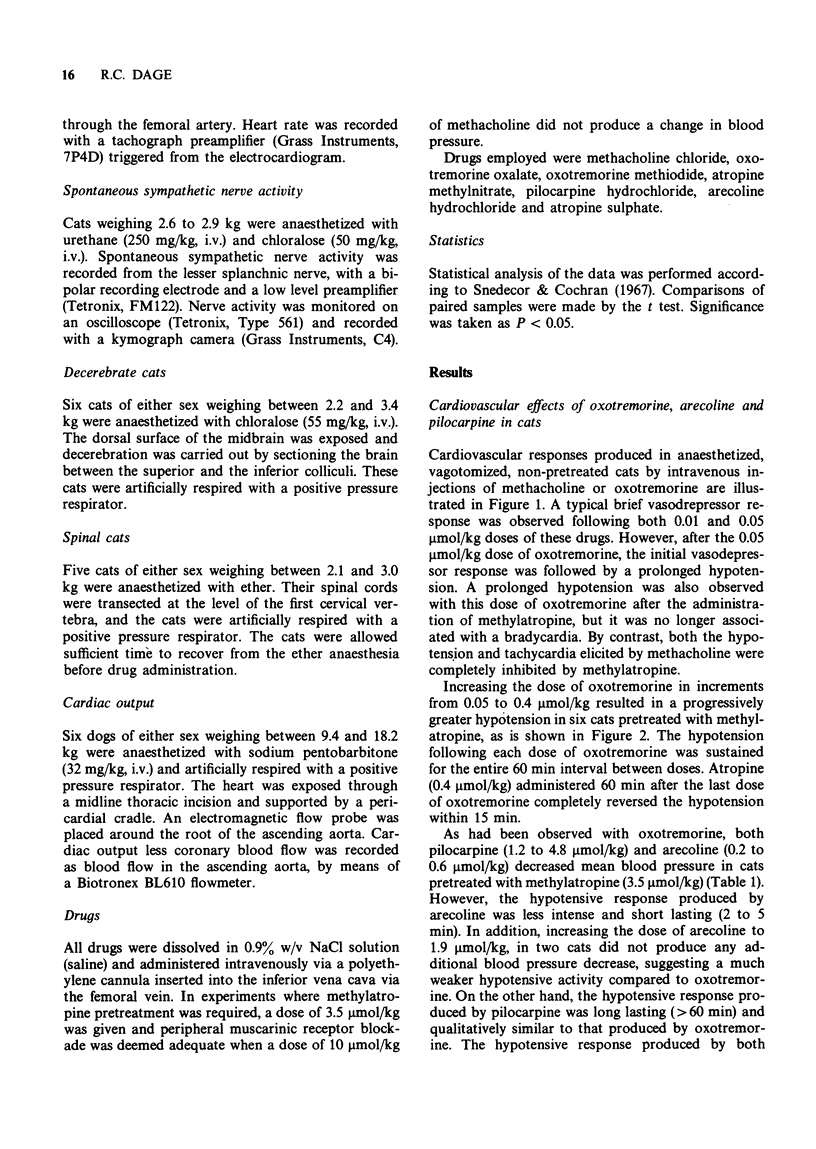
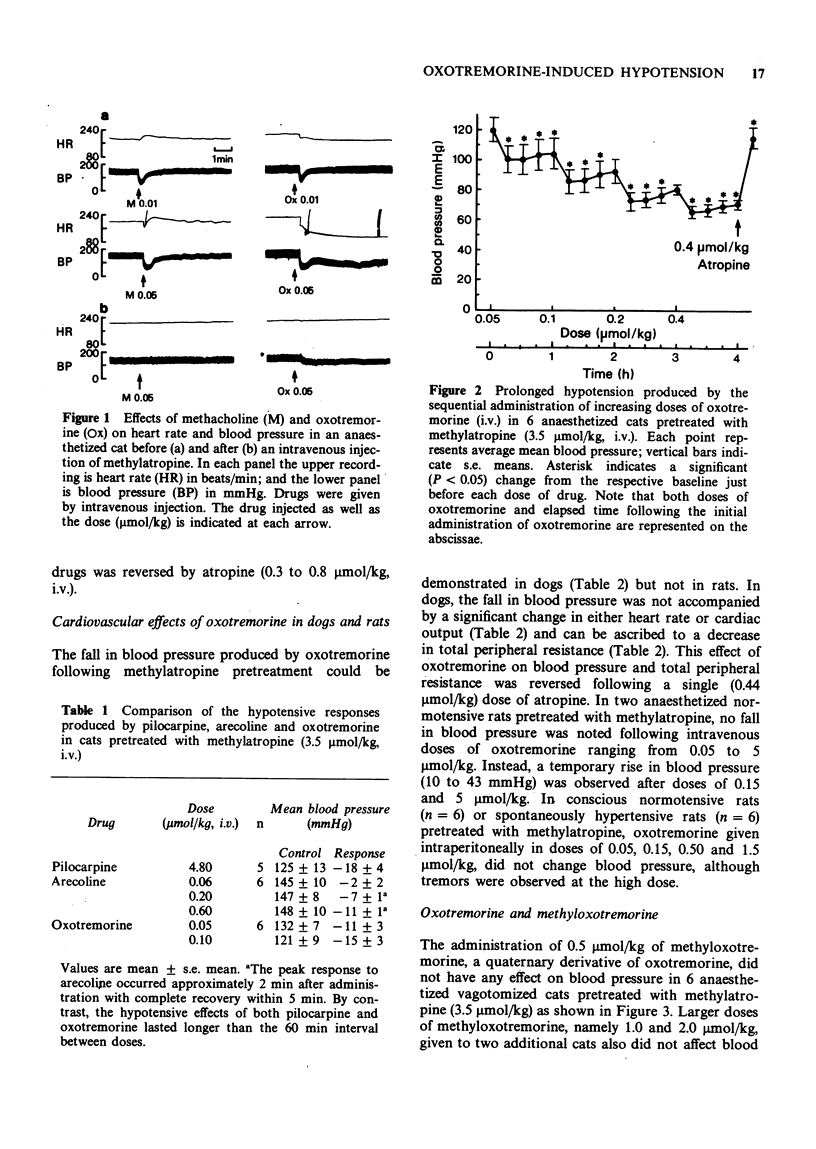
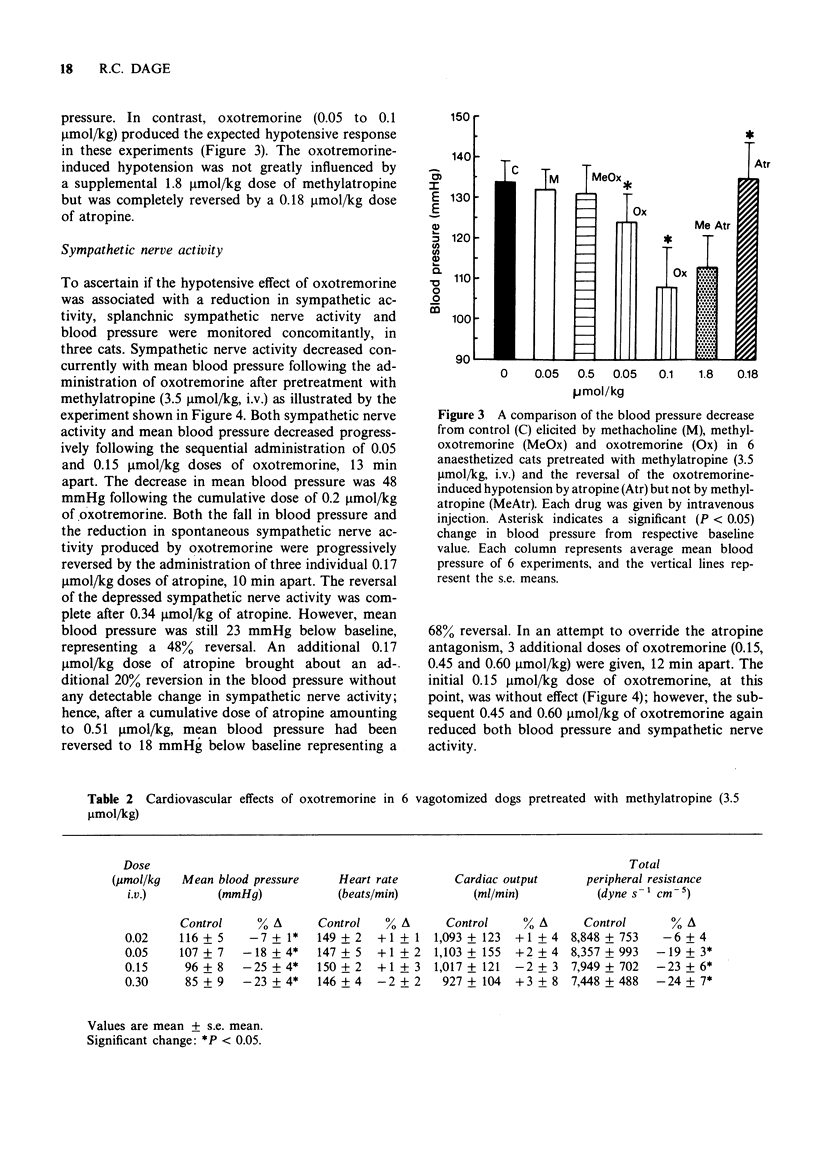
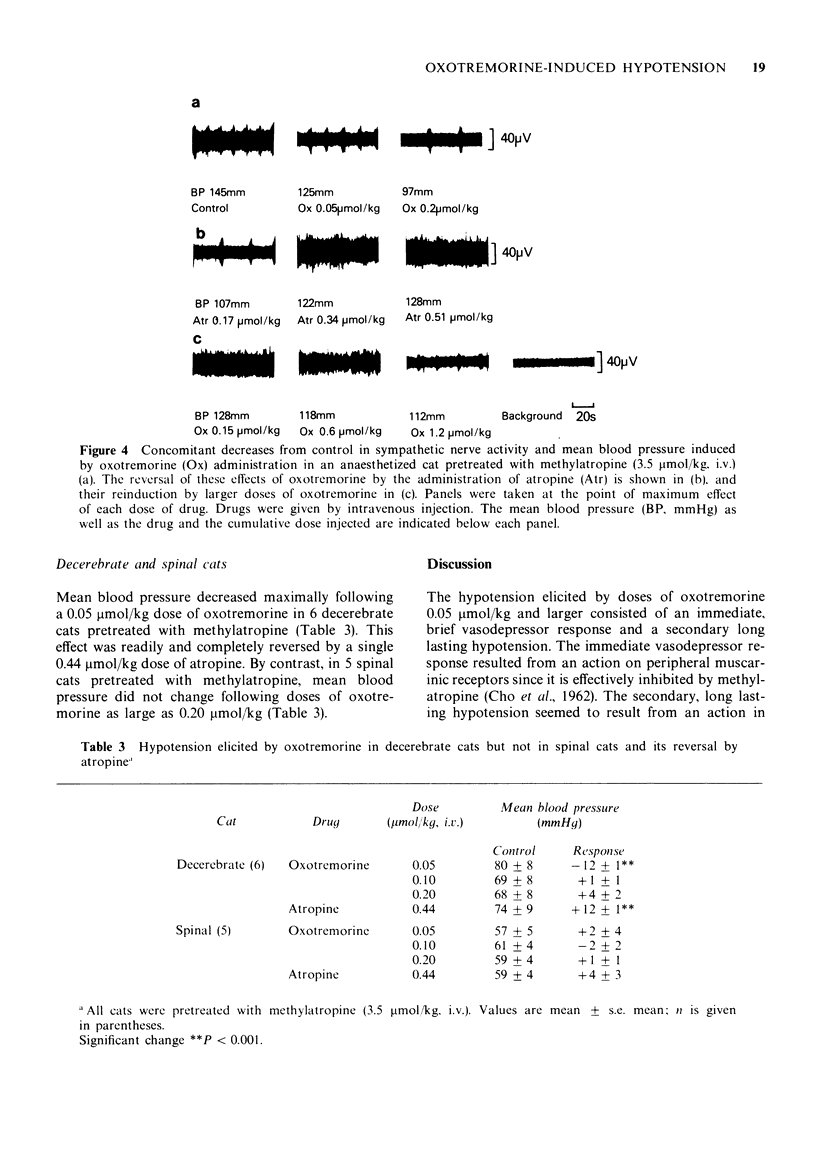
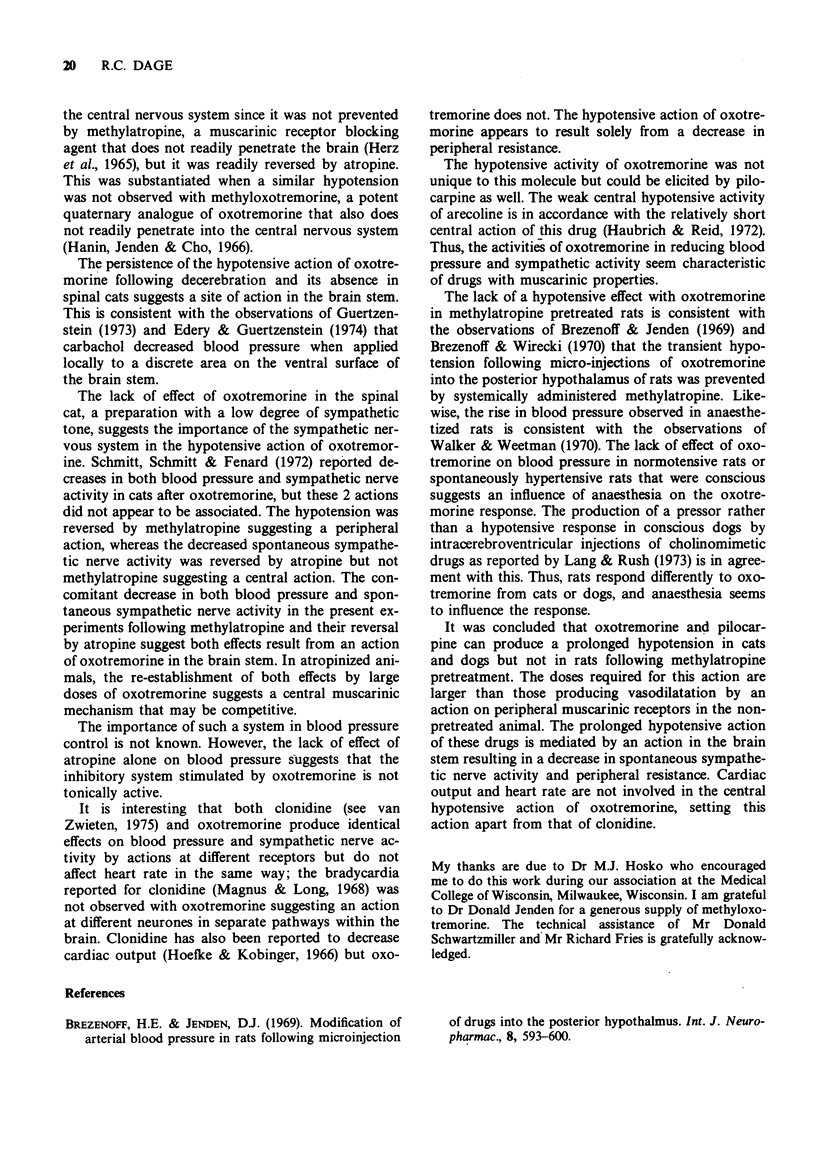
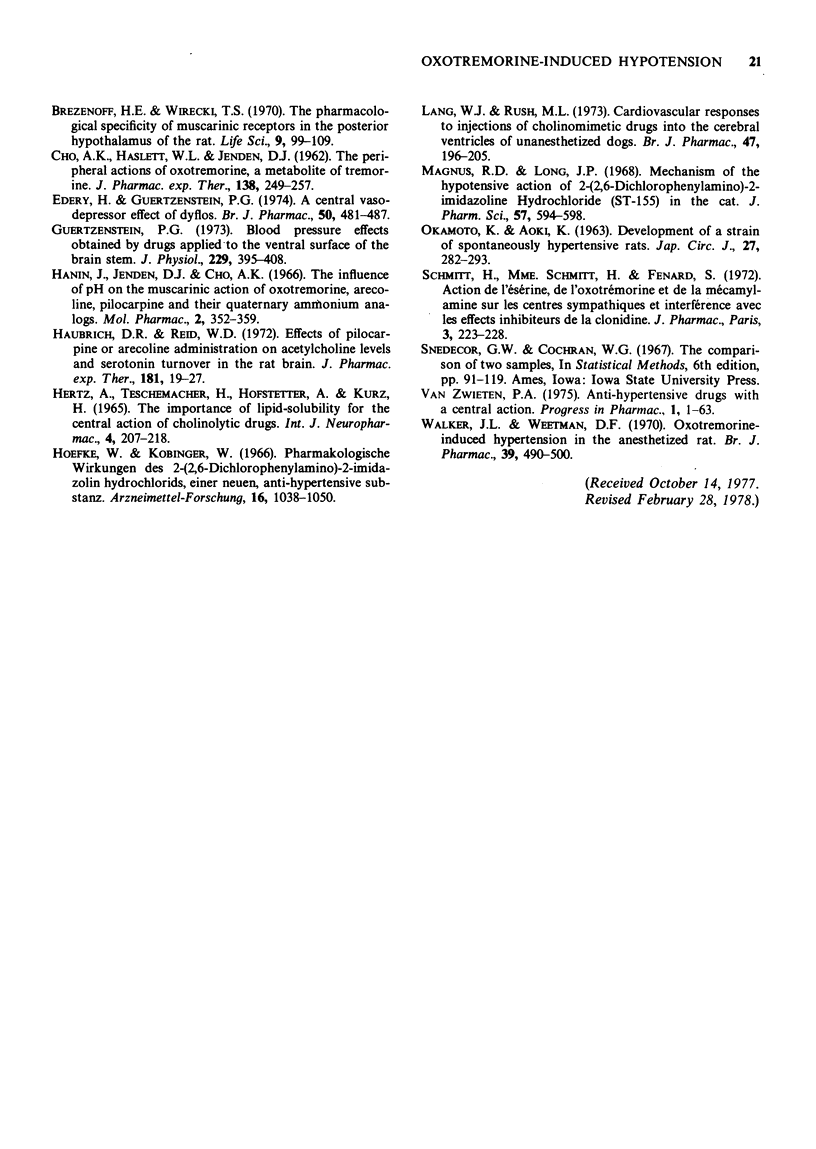
Selected References
These references are in PubMed. This may not be the complete list of references from this article.
- Brezenoff H. E., Jenden D. J. Modification of arterial blood pressure in rats following microinjection of drugs into the posterior hypothalamus. Int J Neuropharmacol. 1969 Dec;8(6):593–600. doi: 10.1016/0028-3908(69)90076-8. [DOI] [PubMed] [Google Scholar]
- Brezenoff H. E., Wirecki T. S. The pharmacological specificity of muscarinic receptors in the posterior hypothalamus of the rat. Life Sci I. 1970 Jan 15;9(2):99–109. doi: 10.1016/0024-3205(70)90022-6. [DOI] [PubMed] [Google Scholar]
- CHO A. K., HASLETT W. L., JENDEN D. J. The peripheral actions of oxotremorine, a metabolite of tremorine. J Pharmacol Exp Ther. 1962 Nov;138:249–257. [PubMed] [Google Scholar]
- Edery H., Guertzenstein P. G. A central vasodepressor effect of Dyflos. Br J Pharmacol. 1974 Apr;50(4):481–487. doi: 10.1111/j.1476-5381.1974.tb08581.x. [DOI] [PMC free article] [PubMed] [Google Scholar]
- Guertzenstein P. G. Blood pressure effects obtained by drugs applied to the ventral surface of the brain stem. J Physiol. 1973 Mar;229(2):395–408. doi: 10.1113/jphysiol.1973.sp010145. [DOI] [PMC free article] [PubMed] [Google Scholar]
- HERZ A., TESCHEMACHER H., HOFSTETTER A., KURZ H. THE IMPORTANCE OF LIPID-SOLUBILITY FOR THE CENTRAL ACTION OF CHOLINOLYTIC DRUGS. Int J Neuropharmacol. 1965 Jul;4:207–218. doi: 10.1016/0028-3908(65)90037-7. [DOI] [PubMed] [Google Scholar]
- Hanin I., Jenden D. J., Cho A. K. The influence of pH on the muscarinic action of oxotremorine, arecoline, pilocarpine, and their quaternary ammonium analogs. Mol Pharmacol. 1966 Jul;2(4):352–359. [PubMed] [Google Scholar]
- Haubrich D. R., Reid W. D. Effects of pilocarpine or arecoline administration on acetylcholine levels and serotonin turnover in rat brain. J Pharmacol Exp Ther. 1972 Apr;181(1):19–27. [PubMed] [Google Scholar]
- Hoefke W., Kobinger W. Pharmakologische Wirkungen des 2-(2,6-Dichlorphenylamino)-2-imidazolin-hydrochlorids, einer neuen, antihypertensiven Substanz. Arzneimittelforschung. 1966 Aug;16(8):1038–1050. [PubMed] [Google Scholar]
- Lang W. J., Rush M. L. Cardiovascular responses to injections of cholinomimetic drugs into the cerebral ventricles of unanaesthetized dogs. Br J Pharmacol. 1973 Feb;47(2):196–205. doi: 10.1111/j.1476-5381.1973.tb08317.x. [DOI] [PMC free article] [PubMed] [Google Scholar]
- Magus R. D., Long J. P. Mechanism of hypotensive action of 2-(2,6-dichlorophenylamino)-2-imidazoline hydrochloride (ST-155) in the cat. J Pharm Sci. 1968 Apr;57(4):594–598. doi: 10.1002/jps.2600570409. [DOI] [PubMed] [Google Scholar]
- OKAMOTO K., AOKI K. Development of a strain of spontaneously hypertensive rats. Jpn Circ J. 1963 Mar;27:282–293. doi: 10.1253/jcj.27.282. [DOI] [PubMed] [Google Scholar]
- Walker J. L., Weetman D. F. Oxotremorine-induced hypertension in the anaesthetized rat. Br J Pharmacol. 1970 Jul;39(3):490–500. doi: 10.1111/j.1476-5381.1970.tb10357.x. [DOI] [PMC free article] [PubMed] [Google Scholar]


